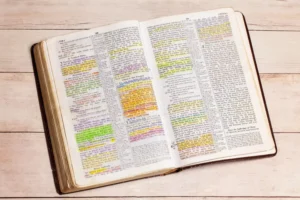“Here, just try it.” Those were the most frustrating words when I tried to learn ballroom dancing in college. I’m a sequential person and would do much better creating a flowchart of possible step combinations than venturing out spontaneously, but that doesn’t seem to be how everyone else learns.
It’s been easy enough to make excuses and blow off dancing even though I ought to get more practice. But as a follower of Christ, there are other areas of conflict between my rational tendencies and my faith that I can’t ignore.
To be clear, Scripture does require us to be wise and future minded. Proverbs 4:26 says, “Give careful thought to the paths for your feet and be steadfast in all your ways” (NIV). Jesus himself speaks in Luke 14 about considering the cost before beginning a building. But as much as God desires prudent forethought, He requires faith and complete surrender more than that.
As humans, we crave stability. That’s why I loved Christmas break in college so much, because I knew that even if I failed all my exams, I got to sleep in, bake cookies, and spend time with family for weeks before ever finding out. None of this summer job-hunt business, internship housing search, or studying for CLEP exams looming over my head. I knew exactly what my life would be like for the next couple of months.
This desire for stability is the same reason I used to worry so much about job interviews. In my desire to have my entire life planned out, I placed too much hope on my ability to impress the employer sitting across the desk, not God’s unfailing provision.
Bad things happen when people trust in their own strength. In Genesis 14, Abram refuses to accept treasure and spoils from the king of Sodom so that no man could say that he made him prosperous. God continued to honor His covenant with Abraham years later by providing food, water and shelter for the Israelites as they wandered through the wilderness.
This provision came in many forms, but in each instance, it was by faith and obedience that Moses and the children of Israel received from God. And it was by lack of faith that Moses lost the Promised Land:
So Moses took the staff from the Lord’s presence, just as he commanded him. He and Aaron gathered the assembly together in front of the rock and Moses said to them, ‘Listen, you rebels, must we bring you water out of this rock?’ Then Moses raised his arm and struck the rock twice with his staff. Water gushed out, and the community and their livestock drank. But the Lord said to Moses and Aaron, ‘Because you did not trust in me enough to honor me as holy in the sight of the Israelites, you will not bring this community into the land I give them’ (Numbers 20:9-12).
We often note how the Israelites complained during this journey, but I wonder about Moses’ response. Previously, God commanded Moses to strike a rock with his staff, but here God told Moses to speak to the rock instead (verse 8). I think Moses became attached to a process for miracles. He wasn’t as faithless as the people often were about the nature of God’s provision, but chose conformity to past supernatural methods instead of placing his trust in God’s command alone.
If God is my source, it means I have to break free from a system of predictability. I may not know where the provision is coming from — there’s no way I can prove that a given path will cause me to find a job, be able to pay the bills, find a wife, make an impact for the kingdom, etc. But that doesn’t let me off the hook.
Living a lifestyle of faith is hard when I want to know every detail, but when I sincerely believe God will provide for whatever sort of life I’m called to live, it allows God’s faithfulness to shine through and frees me from the weight of human hopes.
I haven’t put the dance shoes back on yet, but as I learn to let go of my controlling tendencies, I’m much more available to see God’s hand at work around me. I, too, can say with confidence, “The Lord is my helper; I will not be afraid. What can mere mortals do to me?’’ (Hebrews 13:6, NIV).
 Michael Kreuz is a media production specialist, film and literature connoisseur, and adventure-seeker living and working in Washington, D.C.
Michael Kreuz is a media production specialist, film and literature connoisseur, and adventure-seeker living and working in Washington, D.C.
If you would like to contribute a post to the Boundless blog’s “Your Turn” Friday feature, see “Writers Wanted” for more details.











